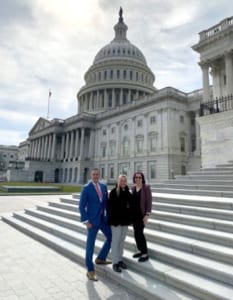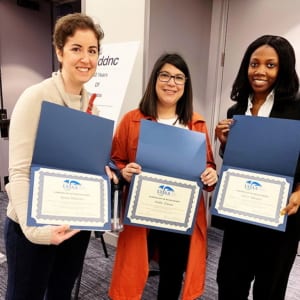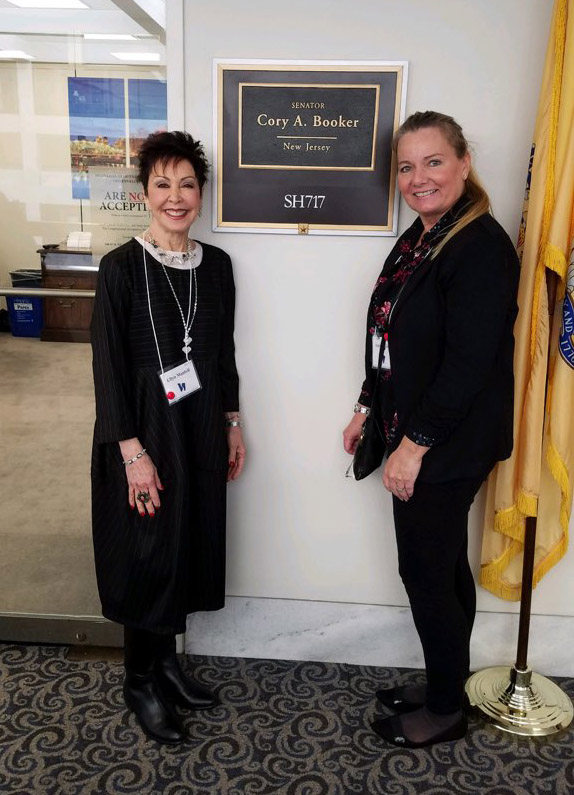By Jeanine Gleba, UOAA Advocacy Manager
The Digestive Disease National Coalition (DDNC) is an advocacy organization composed of the major national voluntary and professional societies concerned with digestive diseases. DDNC’s mission is to work cooperatively to improve access to and the quality of digestive disease health care to promote the best possible medical outcome and quality of life for current and future patients. UOAA has been a member of this coalition for many years.
Each year the DDNC hosts a Spring Public Policy Forum. This year they celebrated their 30th anniversary! This special event was a two-day advocacy conference held March 1-2, 2020 that brought together patient advocates, health care providers, and organizational members of coalition. Passionate and dedicated advocates traveled from 28 states all across the country and Washington DC. Over two days, attendees heard from multiple panels of leaders in the digestive disease community, attended a reception celebrating the coalition as well as its champions, and advocated for medical research and patient care on Capitol Hill.
UOAA had five ostomates representing UOAA and the ostomy community. We are grateful that Lacee Harper, Rena Münster, Michael Quear, Mollie Tinnin and Lynn Wolfson joined UOAA President, Susan Burns, and myself in Washington, DC. They spoke up about improving treatment for digestive diseases, shared their ostomy story and advocated for legislation such as the Removing Barriers to Colorectal Cancer Screening Act and the Safe Step Act. While mingling with attendees, we also had the pleasure of meeting a new ostomate advocate, Nancy Pedersen, and a mother of a young daughter with an ostomy, Jessi Richards, who was attending as a representative for the Megacystis Microcolon Intestinal Hypoperistalisis Syndrome (MMIHS) Foundation. We hope both of them will advocate with UOAA in the future.
 The greatest take-away message from honorees and guest panelists was the impact we make on the Hill. For example, it is truly because of patient advocates sharing their stories that we have seen increases in medical research funding. To give you a glimpse into my day on the Hill, I was on Team 6 with a surgeon from Nebraska and an IBD patient advocate from Connecticut. I found we were met with very positive responses by legislator staffers in the Senate and House. In many cases, the offices we visited were already co-sponsors of the different legislation pieces and this occurred on both sides of the aisle. They certainly all “got” the Safe Step Act and need for proper gluten labeling. When I followed up with my Congressional office (NJ Rep. Josh Gottheimer), they informed me that they have now signed on to the Medical Nutrition Equity Act (H.R.2501). Our visit and advocacy message resulted in a positive outcome!
The greatest take-away message from honorees and guest panelists was the impact we make on the Hill. For example, it is truly because of patient advocates sharing their stories that we have seen increases in medical research funding. To give you a glimpse into my day on the Hill, I was on Team 6 with a surgeon from Nebraska and an IBD patient advocate from Connecticut. I found we were met with very positive responses by legislator staffers in the Senate and House. In many cases, the offices we visited were already co-sponsors of the different legislation pieces and this occurred on both sides of the aisle. They certainly all “got” the Safe Step Act and need for proper gluten labeling. When I followed up with my Congressional office (NJ Rep. Josh Gottheimer), they informed me that they have now signed on to the Medical Nutrition Equity Act (H.R.2501). Our visit and advocacy message resulted in a positive outcome!
New this year we advocated about non-medical switching as it relates to ostomy supplies. It can take patients and their medical team quite a while to find the right “fit” ostomy pouching application system. However, we are finding for example that insurers in some cases are restricting consumers to specific brands, some suppliers switch outpatient preferred choice of products for non-medical reasons such as cost and patients are restricted to using a different brand such as a generic, which do not always have the same quality or reliability. Ostomy supplies are prosthetic devices and a person’s complete pouching system is customized for their unique stoma fit and individual needs. It is not okay for others to just switch that out! We urged Congress to limit out-of-pocket costs and curb current and future payer tactics proactively.
UOAA will continue these advocacy efforts throughout the year. If you have experienced your supplies being switched out for non-medical reasons and it resulted in restricted access to your preferred products or an increase in your out-of-pocket costs or it negatively impacted your health or quality of life, submit your story HERE.



